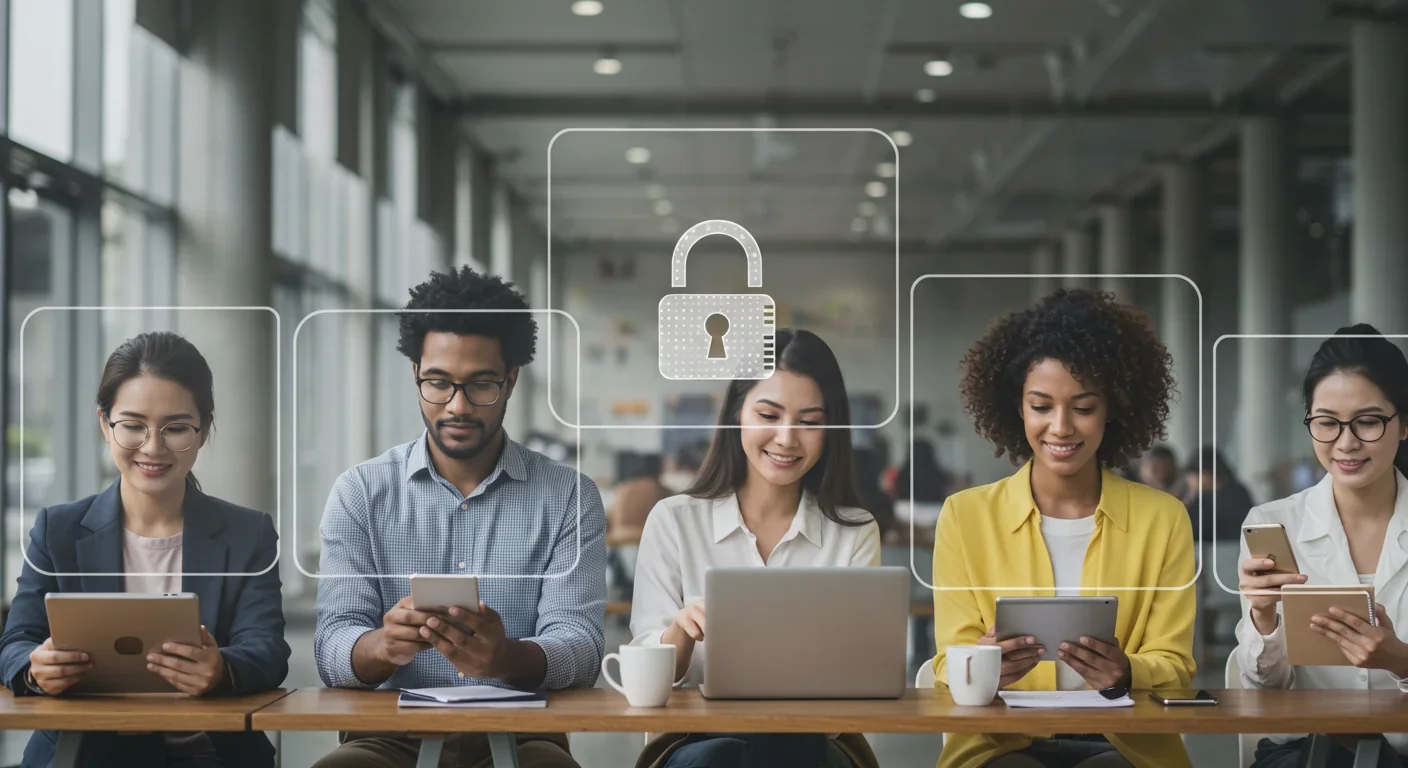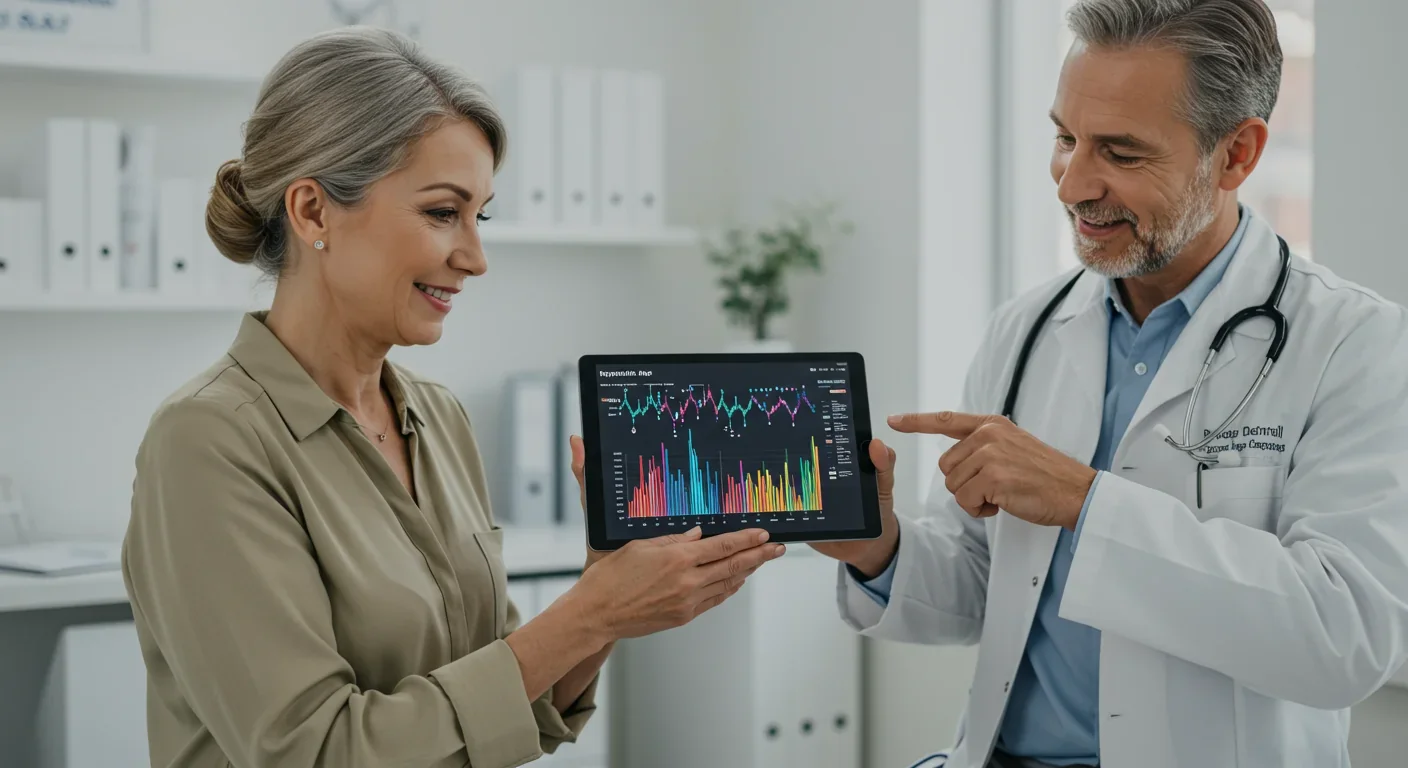Care Worker Crisis: Low Pay & Burnout Threaten Healthcare

TL;DR: Traditional privacy is dead, replaced by surveillance capitalism where tech giants collect vast personal data. Current regulations like GDPR deliver fines but don't change corporate behavior. You can fight back through encryption, minimizing data sharing, and demanding stronger legal protections.

Your phone knows where you slept last night. It tracked every step you took today. It listened to your conversations—not just the ones you had on calls, but the ambient chatter that happened while it sat in your pocket. And somewhere, in a data center you'll never see, an algorithm is deciding what you'll buy next, who you'll vote for, and whether you're a security risk.
This isn't science fiction. It's Tuesday.
We've been telling ourselves a comforting story about privacy: that we control our data through consent. Click "I agree," and you've made an informed choice. Opt in or opt out, and you're the master of your digital destiny.
Except that's not how it works anymore—if it ever did.
When Facebook updated its privacy settings in December 2009, the company framed it as giving users "more granular control." What actually happened? The new default settings made user information accessible to everyone, not just friends or friends of friends. The menus were so labyrinthine that most people gave up and accepted the loosest privacy settings possible. This wasn't consent. It was manufactured surrender.
The consent model assumes two parties with roughly equal power negotiating a fair exchange. But when 3.98 billion people use Meta's family of products every month, there's no negotiation. There's only a terms-of-service agreement you can't read, can't understand, and can't refuse if you want to participate in modern life.
Consider the numbers. As of early 2025, 144 countries have enacted privacy laws covering 79 to 82% of the world's population. That sounds impressive until you realize these laws are largely based on the consent framework—a framework that's already broken. When 5.41 billion people actively use social media worldwide, accessing an average of 6.83 platforms monthly and spending 2 hours and 21 minutes per day scrolling, the volume of data being generated is beyond human comprehension. You can't meaningfully consent to something you can't understand.
Privacy didn't die in a single catastrophic breach. It was gradually monetized, normalized, and finally, abandoned.
The shift began when companies realized that data about human behavior was more valuable than the products they were ostensibly selling. Google didn't just want to show you search results—it wanted to predict what you'd search for next. Facebook didn't just connect friends—it mapped the entire social graph of humanity to sell targeted advertising. Amazon didn't just deliver packages—it studied your browsing patterns to anticipate your desires before you felt them yourself.
This is surveillance capitalism, a term coined by scholar Shoshana Zuboff to describe an economic system built on extracting and commodifying personal data. The more data collected, the more accurate the predictions. The more accurate the predictions, the more valuable the company. And so the incentive becomes clear: collect everything, everywhere, always.
Google Street View offers a perfect case study. While the company was photographing streets around the world, its mapping vehicles were also recording data from unprotected household Wi-Fi networks. When discovered, Google characterized it as inadvertent, a technical glitch. But the incident revealed the truth: when your business model is built on data collection, you collect everything you can, then figure out what to do with it later.
The scope is staggering. Facebook alone has 3.07 billion monthly active users and 2.11 billion daily active users. And 98.5% of those users access the platform on mobile devices, which means Facebook isn't just tracking what you post—it's tracking your location, your app usage, your contacts, your calendar, and your movement patterns throughout the day.
This isn't a bug. It's the entire point.

Governments have noticed the problem. They've responded with what looks like aggressive enforcement but often amounts to regulatory theater.
Take the General Data Protection Regulation, Europe's landmark privacy law. In 2024 alone, EU regulators issued €1.2 billion in fines for GDPR violations—a 33% decrease from 2023. The headlines are impressive. Meta was fined €1.2 billion for violations concerning data transfers between the EU and US. Amazon was fined €746 million for storing advertising cookies without proper consent. Uber was hit with €290 million for transferring driver data to the US without adequate safeguards.
These numbers sound significant until you check the balance sheets. Meta's revenue in 2023 exceeded $134 billion. A €1.2 billion fine represents less than 1% of annual revenue—essentially a rounding error, a cost of doing business. The fines are big enough to generate press releases but small enough that they don't actually change behavior.
And that's in Europe, which has the world's strongest privacy enforcement. The United States has no comprehensive federal privacy law. Instead, there's a patchwork of state regulations, sector-specific rules, and voluntary industry standards that mostly function as fig leaves for unlimited data collection.
The SEC's new material incident reporting rule requires publicly traded companies to disclose cyber incidents within four business days. The Cyber Incident Reporting for Critical Infrastructure Act mandates 72-hour reporting for critical infrastructure entities. These regulations focus on breach disclosure, not prevention—they tell you when your data has been stolen but do nothing to stop the theft in the first place.
To understand why privacy is dead, you need to understand the technology that killed it.
Start with your smartphone. Modern phones are surveillance devices that happen to make calls. They contain GPS chips that track your location to within a few meters. Accelerometers and gyroscopes track your movement and can infer whether you're walking, running, or driving. Microphones and cameras provide audio and visual surveillance. Your browsing history, app usage, purchase history, and social connections are all logged and analyzed.
And that's just what the phone itself collects. The apps on your phone collect exponentially more. A 2019 study found that the average smartphone app shares data with five third-party companies. You download a weather app to check tomorrow's forecast. That app shares your location, device ID, and usage patterns with advertising networks, data brokers, and analytics firms you've never heard of.
Then there's spyware. Not the kind that sketchy websites try to install on your computer, but the sophisticated tools sold by private companies to governments and law enforcement.
Take Pegasus, created by the Israeli cyber-intelligence firm NSO Group. Pegasus can harvest calls, texts, photos, passwords, and location data from phones without leaving obvious traces. It was installed on the phone of Saudi journalist Jamal Khashoggi's wife months before his murder in 2018. It's been used by governments to track politicians, activists, and journalists across the world. The spyware doesn't require you to click a malicious link or download a suspicious app—it exploits vulnerabilities in the phone's operating system to gain complete access.
This is the dark evolution of surveillance technology. It's no longer about what you voluntarily share. It's about what can be taken without your knowledge.
Artificial intelligence has transformed data collection from passive observation to active prediction and manipulation.
Traditional surveillance recorded what you did. AI surveillance predicts what you'll do next and shapes your behavior to match those predictions. It's the difference between a security camera filming a store and an algorithm designed to make you buy things you didn't know you wanted.
The EU AI Act represents the world's first comprehensive attempt to regulate AI systems, establishing a risk-based approach that subjects high-risk AI systems to specific obligations. High-risk AI providers must implement conformance assessments, transparency measures, human oversight, and robust risk management. Full compliance for high-risk systems will be required by 2026 or 2027.
That sounds promising, except the Act is designed to address algorithmic opacity, bias, and legal uncertainty after these systems are already deployed. It's reactive regulation trying to catch up with proactive technology.
Meanwhile, AI systems are getting better at profiling you. They analyze your social media posts to infer your political views, mental health status, and likelihood of criminal behavior. They study your purchasing patterns to predict major life events—job changes, divorces, pregnancies—before you announce them publicly. They evaluate your creditworthiness, your employability, your insurability, all based on data you never deliberately provided.
The EU AI Act attempts to mitigate these risks by strengthening requirements on risk assessment, human oversight, and data governance. But the fundamental problem remains: these systems work by collecting vast amounts of personal data and finding patterns humans can't see. You can regulate the outputs, but regulating the inputs means limiting the data collection that powers the entire digital economy.

Privacy law is fundamentally local. Data collection is fundamentally global. That asymmetry makes enforcement nearly impossible.
Europe has GDPR. California has the California Consumer Privacy Act. China has the Personal Information Protection Law. India is developing its own framework. Each jurisdiction has different definitions of personal data, different consent requirements, different penalties for violations, and different enforcement mechanisms.
Meanwhile, data flows across borders at the speed of light. When you use an app developed in California, hosted on servers in Ireland, owned by a company headquartered in Delaware, which stores data backups in Singapore, which jurisdiction's privacy law applies? The answer is often all of them and none of them simultaneously.
The EU and US agreed on a new Data Privacy Framework in 2023 to permit trans-Atlantic data transfers, replacing the invalidated Privacy Shield. This framework attempts to harmonize competing legal requirements for multinational companies. But it's already facing legal challenges from privacy advocates who argue it doesn't provide adequate protection for European citizens' data when transferred to American companies subject to US surveillance laws.
The AI Act's extraterritorial reach creates a "Brussels Effect," where EU legislation influences global markets. Any AI system placed on the EU market, used within the EU, or whose outputs are used in the EU must comply with EU regulations. That's roughly the same approach as GDPR, creating a de facto global standard.
But extraterritorial enforcement is only as strong as the political will to impose it. When Meta was fined €1.2 billion, the company absorbed the penalty and continued operating. Smaller companies might comply. Larger ones do the math and realize that non-compliance can be more profitable than compliance.
The privacy battle is asymmetric. You're one person with limited time, limited technical knowledge, and limited options. The companies collecting your data employ thousands of engineers, lawyers, and lobbyists whose job is to extract maximum information with minimum friction.
But asymmetric doesn't mean hopeless. Here's what actually works.
Use encryption everywhere. Encryption has moved from best practice to baseline requirement. Organizations that implement enterprise encryption strategies experience 72% reduced impact from data breaches and are 70% less likely to suffer a major breach. For individuals, that means using Signal or WhatsApp for messaging, enabling full-disk encryption on your devices, and using a VPN when connecting to public Wi-Fi.
Minimize data sharing. Every piece of information you provide is a data point that can be collected, analyzed, sold, or stolen. Use privacy-focused search engines like DuckDuckGo instead of Google. Use email aliases instead of your real email address when signing up for services. Use browser extensions that block trackers and ads.
Demand transparency. When companies ask for data, ask why they need it and what they'll do with it. Request copies of your data under GDPR or equivalent laws. File complaints with regulators when companies violate their own privacy policies. Companies respond to pressure, especially public pressure that threatens their reputation.
Support privacy-first alternatives. Choose products and services from companies that make privacy a competitive advantage rather than an afterthought. Pay for services instead of using "free" versions funded by advertising and data collection. The adage is true: if you're not paying for the product, you are the product.
Push for structural change. Individual actions matter, but systemic problems require systemic solutions. Support politicians who prioritize privacy regulation. Advocate for laws that ban certain types of data collection rather than just requiring disclosure. Push for interoperability requirements that let you switch services without losing access to your social network or data.
The most radical act might be strategic disconnection. You probably can't leave the digital ecosystem entirely without sacrificing career opportunities, social connections, and basic conveniences. But you can choose which platforms get your data and which don't. You can use social media without sharing your real-time location. You can use email without letting Google read your messages. You can search the web without being profiled.
The trajectory is clear. More devices will come online—the Internet of Things will connect everything from your refrigerator to your car to your toothbrush. More AI systems will analyze the resulting data streams, looking for patterns and making predictions. More companies will realize that data is the most valuable commodity they can extract.
But there's a countervailing force: people are getting angry.
The Cambridge Analytica scandal in 2018 exposed how personal data could be weaponized for political manipulation. The Pegasus revelations showed that even world leaders and journalists weren't safe from surveillance. Regular data breaches have made people realize their information isn't secure even when companies promise to protect it.
That anger is starting to translate into action. Global data protection laws now cover 79-82% of the population, and while current laws are inadequate, they represent a foundation that can be built upon. Privacy-focused technologies are improving—end-to-end encryption is easier to use, privacy-preserving computation is becoming more practical, decentralized systems are offering alternatives to centralized data collection.
The question isn't whether privacy will make a comeback. Privacy as we understood it in the 20th century—the ability to control who knows what about you—is gone. The question is what comes next.
Maybe we develop new social norms around data collection, where certain types of surveillance are considered as socially unacceptable as recording private conversations without consent. Maybe we develop technical architectures that make surveillance structurally difficult instead of trying to regulate it after the fact. Maybe we develop economic models that don't require monetizing every human interaction.
Or maybe we accept the death of privacy as the price of admission to digital life. We trade constant surveillance for convenience, personalization, and connection. We let the algorithms know us better than we know ourselves and hope they use that knowledge benevolently.
That's the choice we're making right now, individually and collectively. Most of us are making it passively, by continuing to use services that track us and accepting terms we don't read for products we can't refuse.
But it doesn't have to be passive. Privacy might be dead, but you can still decide what kind of surveillance you're willing to tolerate and what you're going to fight against. You can encrypt your communications, minimize your data footprint, support privacy-protective legislation, and choose services that respect your autonomy.
You won't win every battle. The surveillance apparatus is too large, too profitable, and too deeply embedded in the infrastructure of modern life. But you can win enough battles to preserve some agency over your digital self.
Because here's the thing they don't want you to realize: the entire system runs on your compliance. Every data point collected, every profile built, every prediction made depends on you continuing to use their services, share your information, and accept their terms.
The moment you stop complying, even partially, the system weakens. Not much. Not enough to bring it down. But enough to matter.
And if enough people stop complying, if enough of us demand actual privacy protections instead of privacy theater, if enough of us refuse to accept surveillance as the inevitable price of digital life, then maybe—just maybe—we can build something different.
Privacy might be dead. But what comes after is still being written.

Recent breakthroughs in fusion technology—including 351,000-gauss magnetic fields, AI-driven plasma diagnostics, and net energy gain at the National Ignition Facility—are transforming fusion propulsion from science fiction to engineering frontier. Scientists now have a realistic pathway to accelerate spacecraft to 10% of light speed, enabling a 43-year journey to Alpha Centauri. While challenges remain in miniaturization, neutron management, and sustained operation, the physics barriers have ...

Epigenetic clocks measure DNA methylation patterns to calculate biological age, which predicts disease risk up to 30 years before symptoms appear. Landmark studies show that accelerated epigenetic aging forecasts cardiovascular disease, diabetes, and neurodegeneration with remarkable accuracy. Lifestyle interventions—Mediterranean diet, structured exercise, quality sleep, stress management—can measurably reverse biological aging, reducing epigenetic age by 1-2 years within months. Commercial ...

Data centers consumed 415 terawatt-hours of electricity in 2024 and will nearly double that by 2030, driven by AI's insatiable energy appetite. Despite tech giants' renewable pledges, actual emissions are up to 662% higher than reported due to accounting loopholes. A digital pollution tax—similar to Europe's carbon border tariff—could finally force the industry to invest in efficiency technologies like liquid cooling, waste heat recovery, and time-matched renewable power, transforming volunta...

Humans are hardwired to see invisible agents—gods, ghosts, conspiracies—thanks to the Hyperactive Agency Detection Device (HADD), an evolutionary survival mechanism that favored false alarms over fatal misses. This cognitive bias, rooted in brain regions like the temporoparietal junction and medial prefrontal cortex, generates religious beliefs, animistic worldviews, and conspiracy theories across all cultures. Understanding HADD doesn't eliminate belief, but it helps us recognize when our pa...

The bombardier beetle has perfected a chemical defense system that human engineers are still trying to replicate: a two-chamber micro-combustion engine that mixes hydroquinone and hydrogen peroxide to create explosive 100°C sprays at up to 500 pulses per second, aimed with 270-degree precision. This tiny insect's biochemical marvel is inspiring revolutionary technologies in aerospace propulsion, pharmaceutical delivery, and fire suppression. By 2030, beetle-inspired systems could position sat...

The U.S. faces a catastrophic care worker shortage driven by poverty-level wages, overwhelming burnout, and systemic undervaluation. With 99% of nursing homes hiring and 9.7 million openings projected by 2034, the crisis threatens patient safety, family stability, and economic productivity. Evidence-based solutions—wage reforms, streamlined training, technology integration, and policy enforcement—exist and work, but require sustained political will and cultural recognition that caregiving is ...

Every major AI model was trained on copyrighted text scraped without permission, triggering billion-dollar lawsuits and forcing a reckoning between innovation and creator rights. The future depends on finding balance between transformative AI development and fair compensation for the people whose work fuels it.